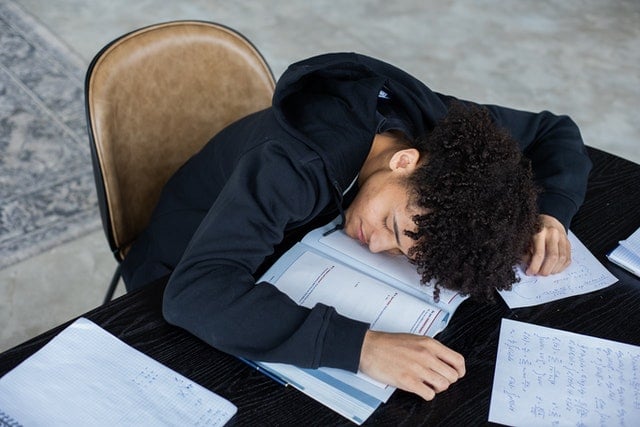Answering the Web’s 11 Most Asked Questions on Facts About Stress in College Students in the USA
Stress among college students has been a hot topic in the U.S for quite some time now, particularly with the Gen Z.
So, today we attempt to answer the internet’s most asked questions on facts about stress in college students.
Let’s dive right in and start with the first question!
11 Most Asked Questions on Facts About Stress in College Students

1. What percentage of college students are stressed?
As per ACHA’s facts about stress in college students, 44.9% report experiencing “more than average” stress levels. Furthermore, 34.3 experienced the average level of stress, while 12.7 experienced tremendous stress.
The study illustrates that over half of the students in America are going through some kind of strife.
2. What kind of stress do college students have?
Facts about stress in college students reveal that the following are the commonly experienced kinds of stress:
- The stress of increased responsibilities
- Lack of good time management
- Changes in eating and sleeping habits
- Lack of self-care.
3. How does stress affect a college student?
36.5% of college students blame stress to be the biggest reason for their poor academic performance. (source: Research.com)
The pressure of achieving good grades often hinders the students’ ability to concentrate during lectures or studying, which unfortunately leads to poor academic performance.
4. What are the most significant stressors for college students today? What causes stress among college students?

– As per APA’s college student stress statistics for 2020, 87% of young adults aged 18–23 cite education as a significant stress source.
– 70% of students stress about their financial situation. (source: Guide2Research)
The younger generations are heavily stressed due to issues relating to their financial situation. While the majority of college students work part-time to pay for their expenses.
Also Check: Best Stress-Free Jobs Without Degree!
– College student stress statistics show that 69% of first-year college students suffer from severe forms of homesickness.
– For 31% of students, exams and midterms are the most significant sources of stress.
– Over 30% say academic demands including heavy course loads and changed curriculums are the top stressors for a college student.
– Classes and workload are the major source of stress for 23% of college students.
– Finding a job after graduation is the reason 24% of students in the United States are stressed about their future. (source: Guide2Research)
– According to college student stress statistics, one-fourth of students at universities fear that they might not land a job in their respective fields.
– As per ACHA’s college student stress statistics, 30.5% of college students say intimate relationships cause them stress.
While course work and other factors relating to college are the obvious causes of college stress, personal relationships have a strong impact on a student’s mental health too. So much so that almost one-third of students find it tough to achieve balance in their studies and relationships.
5. Are college students more stressed than adults?
While previously millennials (22-37) were considered to be the stressed-out generation, it seems Gen Z (18-21) – currently, college students – has taken it far ahead.
Gen Z has outpaced all older generations in stress as per a new study by the American Psychological Association (APA).
9 in 10 Gen Zs between the ages of 18 and 21 report moderate to high levels of stress as compared to around 75% of their elders.
6. How common is stress in college students?
This is one of the key facts about stress in college students. Around half of the college students are suffering from stress. (source: WhatToBecome, 2021)
This statement makes it very clear and obvious that stress in college students is common in the US. Now, this might not seem as urgent to some, but the impending levels of stress among young adults is a grave issue that needs immediate redressal.
While the authorities take their time to strategize how to reduce stress among college students, there are many self-help tips that can help students relieve their stress. Some of the ways are discussed further in the article. So stick around!
7. How much rest do college students get?
40% of college students in America report feeling well-rested for only two days a week. (source: Healthy Sleep)
The amount of stress college students in the US face is tremendous. Recent studies on facts about stress in college students suggest that only a small proportion of students take enough rest, and claim to be well-rested.
Moreover, only 11% of students sleep well at night.
8. How does exercise helps manage stress in college-aged students?
The next question pointing towards the facts about stress in college students asks for a solution many are looking answers for. So, let’s try to debunk this.
It is not easy for college students to find a balance between trying to maintain steady academics and their social lives.
While they are trying hard to find ways to deal with the stress, a great way to cheer up, both mentally and physically, is regular exercise.
Here are the top three ways exercise can help manage stress in college-aged students.
1. Improves Quality of Sleep

We have all experienced those long days where we just want to get in the bed and promptly nod off, sleep for days, hibernate almost!
Haven’t we?
Unfortunately, that sleep does not last long because a new day is always ahead, with just as hectic a schedule as the last one. No doubt one of the biggest causes of stress among college students is lack of sleep. Not getting an adequate amount of sleep can be intense and affect your functioning.
The Sleep Foundation states that exercise can help with this stress. The benefits are reaped maximum if one exercises in the afternoon. The body-heating effects of exercise increase body temperature and the post-exercise fall in the temperature promotes falling asleep.
2. Improves Academic Performance
Did you know?
Exercise can increase the size of your brain, states a study from California College San Diego. Aerobic exercise increases the size of the hippocampus. This part of the brain is associated with memory and learning.
To fuel these changes, mild to moderate aerobic exercise is recommended for 150 minutes every week.
3. Controls Appetite, Maintaining a Healthy Lifestyle
Moving to college not only implies adjustment in academics but in almost all areas of your life, including your health.
One of the most tricky areas to adjust can be eating habits though. Long Beach City College study finds that regular exercise may help college students strike a balance between their new eating habits while still maintaining a healthy lifestyle.
9. Is it normal to be stressed in college?
Reading about all these college student stress statistics may give rise to the question of whether college stress is normal. Well, to be honest, stress among college students is not new.
The Amerian College experience is incomplete without social pressures, difficult course loads, anxiety over homesickness, and other issues. So YES, it is normal to be stressed in college.
*However*
In today’s time, the stress levels and psychological suffering that college students are going through are unquestionably higher than previously.
As per a national survey published in the Journal of Abnormal Psychology, major depression among young adults (18-25) increased by 63% between 2009 and 2017.
10. How to reduce stress in college students?
All colleges and universities often offer to counsel and help students to cope with various issues and this includes dealing with stress. However, college student stress statistics reveal that 77% of students have never used any such support offered to deal with stress. (source: College Pulse)
So, how do they cope?
- 65% use video chats with friends and family as the primary tool to cope with stress.
- 52% resort to phone calls.
- 40% say watching TV/movies help them.
- 38% like to have in-person time with friends.
- 34% play video games to relieve stress.
(source: Timely)
11. Who are the most stressed students in the world?
When it comes to the most stressed students in the world, college students definitely top the list.
24% of students in the US are stressed about their future and finding a job after graduation.
6 out of every 10 college students in America experienced overwhelming anxiety, while over 4 out of 10 were saddled with major depression.
Conclusion
It is true that college life is a bit more advanced compared to high school.
Students are expected to thrive socially, manage financially, and adjust to living away from home. All of it in addition to an increased academic commitment.
As a result, as per a survey conducted by the American College Health Association in 2015, stress has become the major academic hindrance among students at over a hundred colleges and universities across the US.
This must be viewed as a serious situation with organizations and groups working across colleges and universities to reach out to college students and help them find ways to deal with stress.
Students must also feel free to reach out to their college or university counselors and deal with the root cause of the excessive stress they are facing.
Do you have questions regarding Facts About Stress in College Students? Please let me know in the comment below.

![[Easy Way] How To Get A Job In Another Country Before Moving?](https://9to5job.us/wp-content/uploads/2022/10/Easy-Way-How-To-Get-A-Job-In-Another-Country-Before-Moving.jpg)

